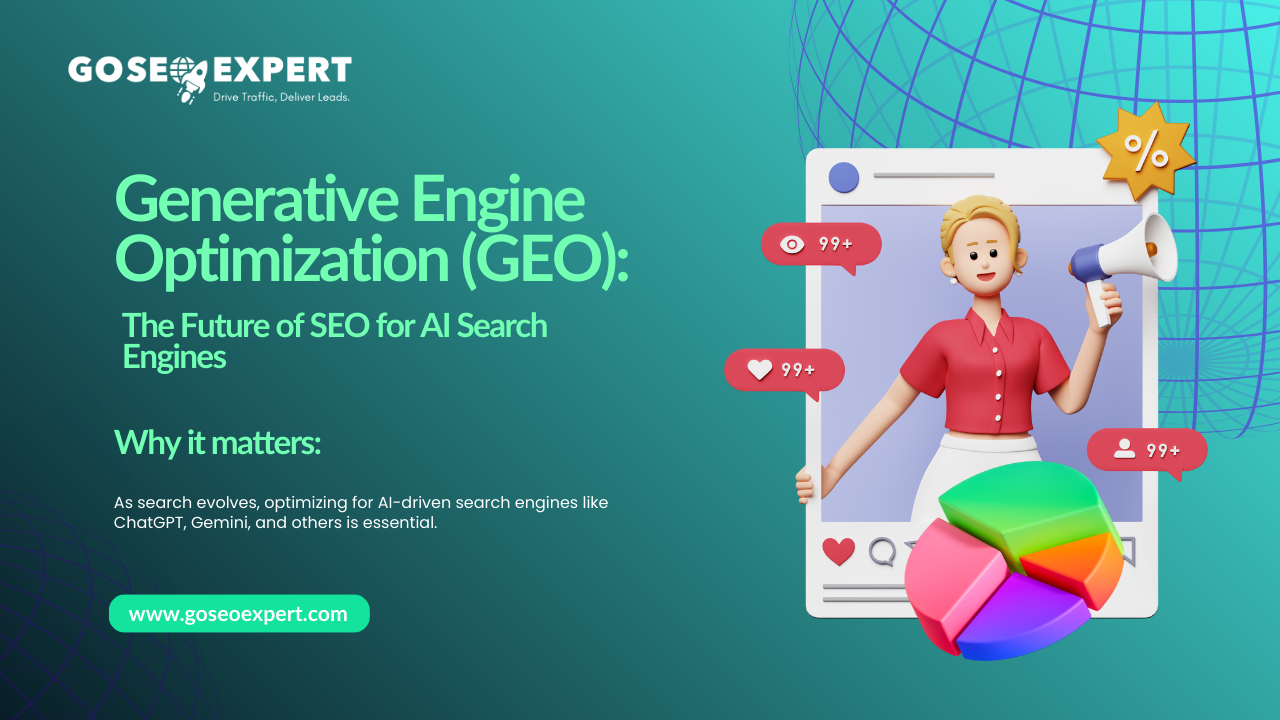Introduction to Generative Engine Optimization
SEO has always been about ranking higher on Google. But in 2025, the game has changed. With the rise of AI-powered search engines like ChatGPT, Google Gemini, and Perplexity AI, users no longer browse long lists of links. Instead, they get direct, AI-generated answers. This shift has created a new era in digital marketing: Generative Engine Optimization (GEO).
At GO SEO EXPERT, we help businesses in Delhi, across India, and globally adapt to this new wave of search technology.
Why Traditional SEO Alone Isn’t Enough in 2025?
The Rise of AI Search Engines
Search is no longer limited to Google. Millions now use ChatGPT, Gemini, and Perplexity AI for instant answers. These platforms rely on large language models (LLMs) to generate results instead of showing blue links.
How Generative AI Changes Search Results
Instead of sending traffic to multiple websites, AI search engines summarize content into one cohesive answer. This means if your brand isn’t optimized for generative engines, you risk becoming invisible.
What is Generative Engine Optimization (GEO)?
Definition & Key Concepts
GEO is the process of optimizing your content to appear in AI-generated responses. It ensures that when users ask AI a question, your brand’s content is part of the answer.
Difference Between SEO and GEO
- SEO focuses on ranking on Google SERPs.
- GEO focuses on influencing AI-driven answers.
Why GEO Matters for Businesses in 2025?
Shaping AI-Generated Answers
GEO ensures that your business gets mentioned in the AI’s summarized output, making it a trusted authority.
Increasing Visibility in Conversational Search
With voice and chat-based queries growing, GEO helps brands stay visible in conversational ecosystems.
Building Brand Authority in AI Ecosystems
The more often your content is cited by AI engines, the stronger your authority becomes.
Key Strategies for GEO Success
Optimizing Content for AI Summaries
Content should be clear, concise, and answer-driven, since AI engines pull direct answers.
Using Metadata (e.g., llms.txt)
New metadata files like llms.txt allow publishers to guide how AI models use their content.
Structured Data & Contextual Relevance
Schema markup and context-rich content increase the chances of inclusion in AI responses.
Conversational Keywords & FAQs
Since user’s phrase queries conversationally with AI, adding Q&A-style content boosts visibility.
Real-World Applications of GEO
E-commerce and Product Discoverability
AI-powered shopping assistants can recommend your products if optimized for GEO.
Service-Based Businesses (Local & Global)
From digital agencies to healthcare, GEO ensures your services appear in AI suggestions.
Content Publishers and Thought Leaders
Bloggers and media outlets benefit by being cited as credible sources in AI-generated responses.
Tools & Technologies Supporting GEO
- Surfer SEO & Jasper – Align content with AI-friendly keywords.
- SEMrush AI Features – Analyze GEO performance and AI visibility.
- Metadata Management Tools – Implement
llms.txtand schema effectively.
Challenges & Limitations of GEO
Lack of Standardization
Unlike SEO, GEO doesn’t yet have fixed rules across all AI engines.
Ethical Concerns with AI Training Data
Some content may be used by AI without proper attribution, raising copyright and ethical issues.
Future of GEO in SEO Industry
Integration with Voice & Multimodal AI
With voice and image-based search rising, GEO will evolve beyond text.
Predictive Search & Personalized Results
AI will deliver personalized answers based on user history, making GEO even more critical.
How GO SEO EXPERT Helps Businesses with GEO?
At GO SEO EXPERT, we help businesses stay ahead with GEO by:
- GEO-Optimized Content Strategy – Structuring blogs, FAQs, and product pages for AI inclusion.
- Technical SEO for AI-Driven Search – Using metadata, schema, and
llms.txtfiles. - Global SEO Expertise – Serving both Indian and global markets with AI-first strategies.
FAQs
Q1: What is Generative Engine Optimization (GEO)?
GEO is the process of optimizing content for AI-driven search engines like ChatGPT and Gemini.
Q2: How is GEO different from SEO?
SEO is for ranking in Google SERPs, while GEO ensures visibility in AI-generated answers.
Q3: Why is GEO important in 2025?
With AI search engines growing, businesses risk losing visibility without GEO.
Q4: What strategies help with GEO?
Q&A content, schema markup, metadata, and clear summaries are key.
Q5: Can small businesses benefit from GEO?
Yes! GEO can help startups and SMEs gain visibility in AI-driven platforms.
Q6: How does GO SEO EXPERT provide GEO services?
We implement AI-friendly strategies, metadata, and technical optimization for maximum visibility.

